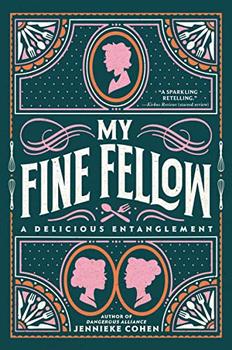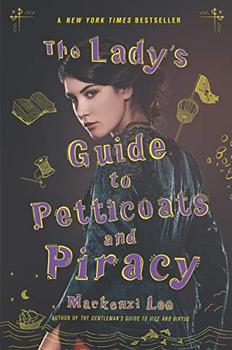Summary | Excerpt | Reviews | Beyond the book | Read-Alikes | Genres & Themes | Author Bio

Jennieke Cohen's first young adult novel, Dangerous Alliance, was an Austen-inspired feminist historical mystery/romance laced with numerous literary allusions. She follows up that romp with an even more delicious standalone that's a fun, fresh spin on My Fair Lady.
In Lerner and Loewe's famous musical, a professor of phonetics, Henry Higgins, contends that he can grant Eliza Doolittle, a working-class flower seller, entrée into society just by helping her lose her Cockney accent and teaching her to speak like a lady. In the end, though, it's kind, big-hearted Colonel Pickering who sees the best in Eliza and views her as a fully realized person, not just as a project.
In Cohen's story, as the title suggests, the gender roles are reversed. The year is 1833, and in the novel's altered version of English history (explained in a helpful author's note), Queen Charlotte is on the throne. In this fictional Charlottian age, young women have many more professional opportunities than they would have had in our 19th century. Two of these young women are on the verge of graduating at the top of their class from the Royal Academy of Culinaria Artisticus: Lady Helena Higgins and her best (perhaps only?) friend Penelope Pickering. Once they graduate, they will both be hugely sought-after Culinarians, creating amazing dishes for the top tier of English society.
One night at the market, the two friends encounter an empanada peddler, Elijah Little. He is a humble young man from a poor background. His dream is to open his own food shop someday, but (unbeknownst to Lady Helena and Penelope) he is Jewish, which bars him from operating a retail business. As soon as Lady Helena takes one bite of Elijah's empanadas, she knows she's found her final project for the Royal Academy: She'll take Elijah's raw talent and turn him into the country's greatest gentleman chef, to be tested at an upcoming culinary tournament.
As Elijah's education in cooking and comportment gets underway, the stakes grow steadily higher, especially when it's revealed that the crown princess will select her future husband from among the cooking competition's gentlemen finalists. But as Lady Helena's competitive drive and her prejudices keep her from understanding what Elijah wants or needs, Penelope begins to recognize a kindred spirit in the young man.
My Fine Fellow will absolutely be enjoyed by readers whether or not they've seen the Lerner and Loewe musical by which it's inspired; certainly fans of My Fair Lady will appreciate spotting the references Cohen cleverly sprinkles into her prose, but they're hardly essential. More at the heart of the novel is a celebration of food and cooking, and of the ways in which food can connect us to our personal heritage and also open up the whole world. Fans of The Great British Bake Off or similar cooking competition shows will find much to love here, as the food Elijah and his fellow competitors create is described in mouthwatering detail (Cohen also helpfully includes one of Elijah's empanada recipes at the novel's end).
But beyond these surface delights, not to mention the swoony romance that slowly brews between Penelope and Elijah, My Fine Fellow is also a meaningful exploration of the intersecting identities that define people. In addition to Elijah's hidden Jewish identity, Penelope contends with rumors and prejudices surrounding her parents' mixed-race marriage. Helena is both the prickliest and most fascinating character in the novel; she is forced to do some real soul-searching when her "project" grows out of her control, and to grapple with how her behavior and small-minded thinking have alienated the people who really matter to her.
In My Fine Fellow, Jennieke Cohen has clearly landed on a winning recipe; readers will be eager to see what this talented novelist cooks up next!
![]() This review was originally published in The BookBrowse Review in March 2022, and has been updated for the
January 2023 edition.
Click here to go to this issue.
This review was originally published in The BookBrowse Review in March 2022, and has been updated for the
January 2023 edition.
Click here to go to this issue.

If you liked My Fine Fellow, try these:

by Krystal Marquis
Published 2024
The first in a breathless YA series set in 1910 Chicago, The Davenports offers a glimpse into a period of African American history often overlooked, while delivering a totally escapist, swoon-worthy read

The Lady's Guide to Petticoats and Piracy
by Mackenzi Lee
Published 2020
Felicity Montague must use all her womanly wits and wiles to achieve her dreams of becoming a doctor - even if she has to scheme her way across Europe to do it.
Your guide toexceptional books
BookBrowse seeks out and recommends the best in contemporary fiction and nonfiction—books that not only engage and entertain but also deepen our understanding of ourselves and the world around us.